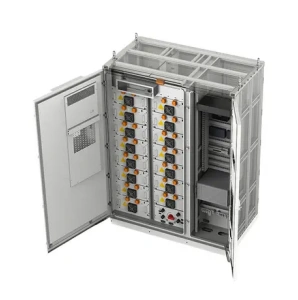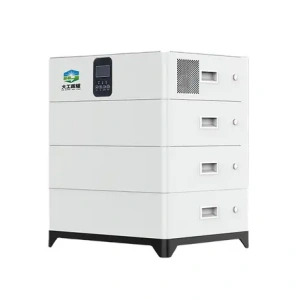As the world shifts toward renewable energy and sustainable electricity use, the question is no longer just how we generate power—but how we store it. Energy storage has become the cornerstone of a flexible, reliable, and low-carbon power system. Among various energy storage technologies, Battery Energy Storage Systems (BESS) stand out as the most efficient, scalable, and widely adopted solution.
At its core, a battery energy storage system stores electricity in chemical form for later use. When paired with solar panels, wind turbines, or even the conventional grid, BESS can provide backup power, smooth out energy supply fluctuations, and reduce electricity costs. But not all BESS are created equal. Depending on the application scenario, location, and scale, battery energy storage systems come in multiple types.

Understanding Battery Energy Storage Systems (BESS)
Before diving into the types, let’s first understand what a battery energy storage system really is.
A Battery Energy Storage System (BESS) is an advanced solution that stores electrical energy in rechargeable battery cells for later use. It is composed of battery packs, power conversion systems (PCS), battery management systems (BMS), cooling systems, and control software. Energy is stored electrochemically and can be rapidly discharged when demand arises.
BESS efficiency is remarkably high, with round-trip efficiency ranging from 85% to 95%, depending on battery chemistry and system design. These systems play an essential role in:
Time-shifting energy usage (storing excess energy and using it later)
Providing backup power during outages
Stabilizing grid frequency and voltage
Supporting renewable integration and reducing fossil fuel dependence
Residential BESS: Powering the Modern Home
Residential battery energy storage systems are designed for individual households. They work alongside rooftop solar panels or grid connections to provide energy independence, cost savings, and backup power.
Homeowners are increasingly adopting these systems to:
Store solar energy during the day for use at night
Reduce reliance on expensive peak-time grid electricity
Maintain power during blackouts or extreme weather events
A typical residential BESS is compact, quiet, and easy to install. It usually has a storage capacity ranging from 5 kWh to 30 kWh, enough to power essential household loads like lighting, refrigeration, and electronics.
Dagong Huiyao’s Residential BESS is engineered with high safety standards and modular design. Each unit weighs less than 4 tons, ensuring easy installation, even in tight urban settings. The system is optimized for thermal management with a precision liquid cooling system that maintains battery temperature variation below 2°C—extending lifespan and boosting reliability.
With the growing trend of home electrification, residential BESS is no longer a luxury but a smart investment in energy resilience.
Industrial & Commercial ESS: Smart Energy for Business
Industrial and commercial energy storage systems serve larger energy consumers such as factories, office buildings, data centers, shopping malls, and EV charging stations. These systems typically require higher power and storage capacity—often in the hundreds of kilowatt-hours to several megawatt-hours.
Businesses choose BESS for several key reasons:
Peak shaving: Reduce electricity bills by using stored energy during peak-rate periods
Demand charge reduction: Lower costs tied to maximum electricity usage
Uninterrupted operations: Provide emergency backup to critical systems
Sustainability goals: Pair with solar or wind to reduce carbon footprint
Industrial BESS must be rugged, scalable, and highly efficient. They often operate under challenging conditions, requiring robust safety and thermal management systems.
Dagong Huiyao’s Industrial & Commercial ESS is a standout performer in this category. Built with state-of-the-art lithium battery packs and liquid cooling, the system is designed for high throughput, extended cycle life, and seamless integration with existing power systems. Moreover, the system can work in tandem with power conversion systems (PCS) without the risk of circulating currents or inter-cluster short circuits—a common failure point in lower-grade systems.
By adopting commercial BESS, businesses gain not only cost advantages but also the ability to participate in energy markets, sell back excess power, and support grid reliability.
Container ESS: Scalable Power for Grid and Utility Use
Containerized battery energy storage systems are modular, large-scale storage solutions housed in 20- or 40-foot standard containers. These systems are designed for utility-scale applications such as:
Grid frequency regulation
Renewable energy stabilization
Load balancing across multiple substations
Community-level backup and disaster response
Their container form factor offers advantages like easy transport, quick deployment, and modular expansion. With capacities reaching multiple MWh per container, they are ideal for solar and wind farms, microgrids, and energy-intensive industrial zones.
Dagong Huiyao’s Container ESS is engineered with safety and efficiency at its core. It is built to pass UL9540A cell-level thermal runaway tests, ensuring that the risk of thermal incidents is minimized. The modular layout allows each component to be serviced or replaced independently, greatly reducing downtime and maintenance costs.
Moreover, the use of liquid cooling technology ensures minimal temperature deviation across battery modules, enhancing overall system longevity and performance by up to 30%.
As grid operators seek reliable and flexible storage assets, container ESS has become the go-to solution for large-scale energy management.
Balcony BESS: Compact Storage for Urban Living
One of the most innovative developments in energy storage is the emergence of balcony battery energy storage systems. These compact units are designed for urban apartments and small living spaces where traditional rooftop solar is not feasible.
Ideal for pairing with plug-in balcony solar panels, these systems offer urban dwellers a chance to generate and store their own clean energy without complex permits or installations. Benefits include:
True plug-and-play installation
Small footprint, ideal for limited-space balconies
Affordable entry point to home energy independence
Balcony BESS units typically provide enough energy to run essentials like lighting, small appliances, or even charge electric bikes. They are perfect for renters, students, or anyone seeking a sustainable lifestyle in high-density housing.
Dagong Huiyao has been at the forefront of developing compact, safe, and user-friendly balcony ESS solutions. These systems are designed with intuitive interfaces, lightweight housing, and integrated safety features that make them both practical and efficient.
As cities become smarter and greener, balcony BESS can play a crucial role in democratizing access to clean energy.
Choosing the Right BESS: Application-Based Considerations
With so many types of battery energy storage systems available, how do you choose the right one?
Start by evaluating the following:
Energy needs: How much energy do you consume daily? Do you need short-term backup or long-duration support?
Location: Are you in an apartment, home, business facility, or industrial site?
Budget and space: What is your budget and how much physical space is available?
Integration: Will you pair the BESS with solar panels or a grid connection?
Dagong Huiyao offers a wide range of solutions tailored to every use case—from plug-and-play balcony units to scalable grid-level container systems. The company’s engineering philosophy emphasizes safety, efficiency, and modularity, making it easier for users to find the right fit without compromising performance.

Conclusion
Battery energy storage systems have become a critical part of the energy landscape. As renewable energy grows and the demand for reliable power increases, the need for flexible, efficient, and application-specific storage solutions becomes ever more urgent.
From residential units to industrial-scale containers, and from urban balconies to commercial facilities, the different types of BESS each offer unique advantages. Understanding these differences is key to unlocking the full potential of energy storage.
With a commitment to innovation, safety, and sustainability, Dagong Huiyao Intelligent Technology Luoyang Co., Ltd. stands at the forefront of this transformation. Explore our full range of solutions at www.hybatterypack.com and discover how the right battery energy storage system can power your future—efficiently and intelligently.














